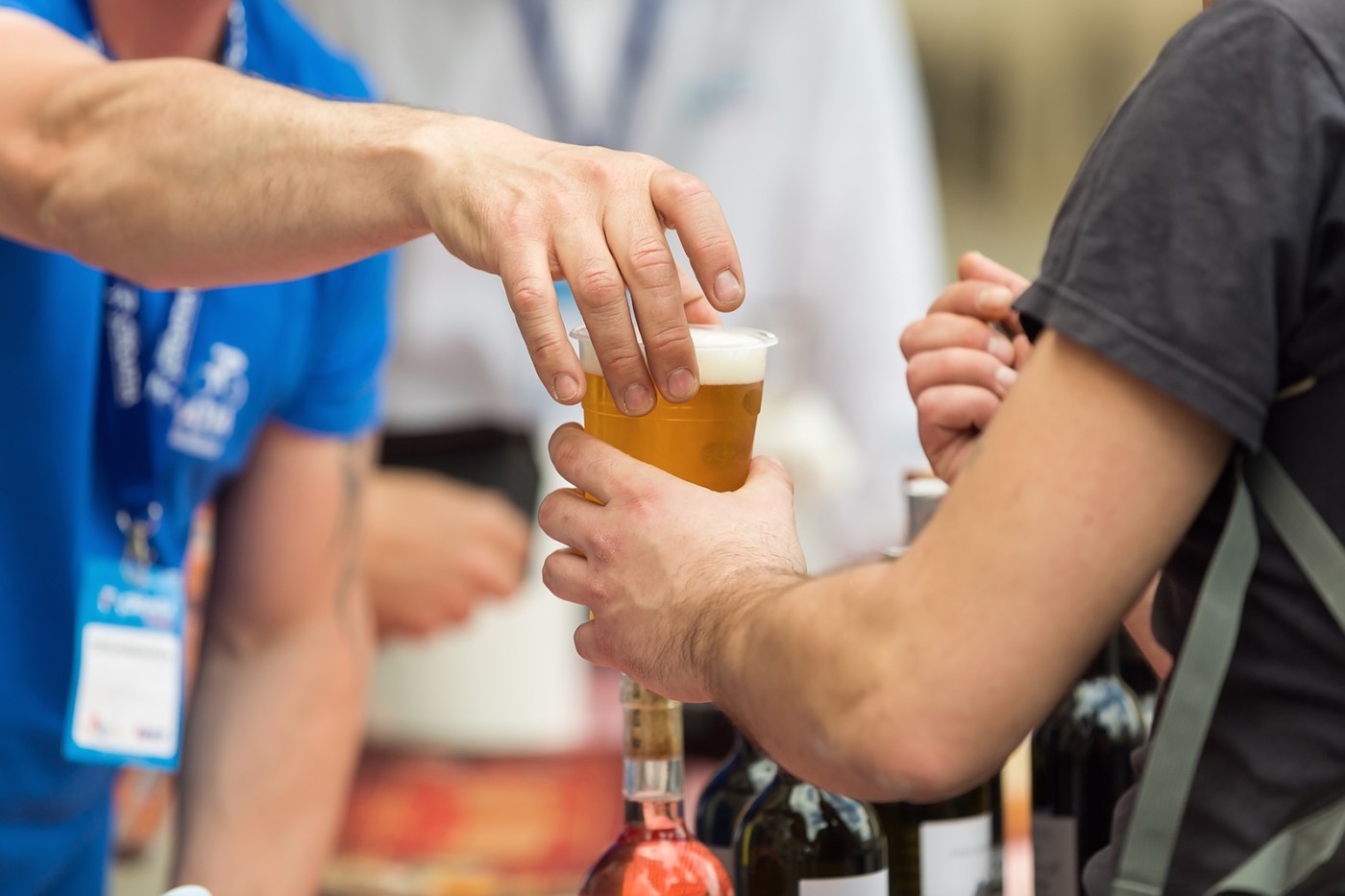
‘I felt so naughty’: New open carry alcohol laws boost downtowns
Holly Smith Mount wanted to be first.
Smith Mount, chair of the city council in Huntington, West Virginia, was determined to see her community launch the state’s initial outdoor drinking zone — an idea made possible only after the legislature changed the state’s alcohol law earlier this year.
“I will fully admit I’m very competitive,” she told Stateline. “And I told the mayor, ‘I want to be first on this one.’”
So, when Huntington’s downtown drinking district launched this fall, Smith Mount aimed to be at the front of the line to grab a beer from a local taphouse. The new program sanctions open containers of alcohol within designated boundaries officially known as a Private Outdoor Designated Area, or PODA.
“I walked down the street and I felt so naughty,” she said. “I went into one of my favorite shops and I was like, ‘Look, I’ve got a beer!’”
Huntington leaders saw the district as a way to encourage economic growth by drawing more people to the heart of the city: The hope is that by allowing people to grab a drink and linger, they’ll spend more time and money downtown. Steps away from the banks of the Ohio River, the zone’s few square blocks include local restaurants, bars and shops.
“To me this was just a cherry on top of our already thriving downtown,” Smith Mount said. “It’s a way to kind of get people outside, get people socializing, and ramp up the economy even more.”
In recent years, several states have relaxed alcohol consumption laws to allow communities to create their own limited drinking zones. They aim to revitalize downtown cores hollowed out by the changing nature of retail and the post-pandemic loss of office workers.
North Carolina cities have been creating outdoor “social zones” since Democratic Gov. Roy Cooper signed a new law in 2021. Dozens of Ohio communities big and small have created Designated Outdoor Refreshment Areas, which the legislature sanctioned in 2015 to allow people to walk around freely with a beer, wine or cocktail. Communities in Kansas and Indiana are exploring or creating new areas after legislatures in both states changed their laws earlier this year.
Indiana’s new outdoor refreshment areas largely mirror those in neighboring Ohio. Republican state Sen. Liz Brown sponsored legislation over the past three years after a constituent enjoyed one of the districts in Ohio and asked her why the Hoosier State didn’t have something similar.
“I don’t usually like to give other states credit, but I do have to give Ohio credit,” she said. “ … We copycatted them.”
Aside from bringing foot traffic to shops and restaurants, officials say the success of the new districts reveals the need to update antiquated liquor laws that long banned public consumption in most places to try to reduce public intoxication and drunken driving. While some critics have raised concerns about the new districts’ potential to promote drinking, crime or littering, organizers across the country say they have largely been adopted without incident.
In West Virginia’s second-largest city, officials said the drinking district faced little public opposition.
Huntington, a city of about 47,000, is home to Marshall University. On football game days, the area around campus is already “basically open container,” Smith Mount said.
The district is open on Thursdays, Fridays and Saturdays from April to October. But Smith Mount said the effort was already so successful that city leaders are looking at expanding the season. In the future, she envisions holiday shoppers clutching mulled cider while browsing in downtown shops.
The Private Outdoor Designated Area isn’t a free-for-all. Only licensed bars and restaurants can sell drinks, which must be served in clearly marked cups — no red Solo cups allowed. Drinks must be consumed within the district’s boundaries. And store owners can choose to opt in or out.
So far, the city hasn’t heard of any problems with the program, officials said.
“In the years past, you had to go to places like New Orleans or Key West to walk down the street just having a cold beverage,” Smith Mount said. “And those days are kind of past us.”
‘This is just the start’
In the northern stretches of Topeka, Kansas, Redbud Park is home to sculpture gardens and bright murals. Once a month, the park turns into a concert venue for the area’s First Friday art walks.
But those performances so far have been alcohol-free, said Thomas Underwood, executive director of the NOTO Arts & Entertainment District.
“At this point you can’t buy a beer from the place across the street and come over and listen to the band, because you can’t cross the street with a beer,” he said. “That just seems stupid.”
Until this year, Kansas law only allowed public consumption areas if streets were blocked off to traffic. Underwood’s nonprofit was among the groups that lobbied legislators earlier this year to make a change.
The First Friday events bring valuable foot traffic to the state capital’s arts district. But Underwood said businesses don’t want to see streets closed off — which could dissuade customers from attending, not to mention the complications of renting barricades and acquiring city permits.
This year, the legislature allowed communities to apply for Common Consumption Area permits that don’t require street closures. The Kansas Department of Revenue reports the state has licensed 32 common consumption areas, in a mix of tiny towns, larger cities and booming suburbs.
With little opposition, Underwood expects Topeka to approve a common consumption area soon. In late October, a Topeka City Council committee discussed creating consumption areas in downtown and in the arts district. The city will hold a series of listening sessions before voting on the matter, said city spokesperson Gretchen Spiker.
If approved, Underwood said, the common consumption area will bring more visitors to concerts, galleries and shops in the arts district — and hopefully boost sales for bars and restaurants.
“Nobody down here thinks it should be a seven-day-a-week-type thing,” he said. “We think it should be somewhat limited. We know there’s going to be some enforcement and management issues with this.”
Kansas Republican state Rep. Tory Blew was among those who supported the change in state law. She sits on the board of Great Bend Alive, a nonprofit that hosts a monthly Friday evening event in downtown Great Bend, a city of about 15,000 in the middle of the state.
Called Fridays on Forest, the event has been held on a side street as Great Bend’s Main Street happens to be a state highway — making street closures there prohibitively difficult. So, organizers have closed down Forest Street to bring in food trucks, games and alcohol. As many as 600 people will attend any given Friday, Blew said.
“People look forward to it,” she said. “It’s just everybody coming together. … I think it’s just a sense of something to do in town.”
She knew Great Bend wanted to expand its Friday events without closing down Main Street, but was surprised to learn how many Kansas communities were also planning big events and celebrations with common consumption areas.
“They all have a totally different vision,” she said.
Great Bend is currently exploring ways to expand the seasonal event now that the state law has changed. In her community, the consumption area is part of a wider effort to rejuvenate downtown: Younger people are moving back or into town, bringing new coffee shops and a brewery.
She said the alcohol district isn’t a panacea but has greatly helped improve downtown’s trajectory.
“We’ve got a great start with what we’ve done so far with the common consumption district,” Blew said. “I think this is just the start of the momentum.”
Recovering from the pandemic
Robin Davis had been worried about opposition in Norwood, North Carolina, a town of about 2,600 people about 50 miles east of Charlotte.
One of the community’s main churches sits just steps away from the small downtown where she aimed to create a social district that would allow alcohol following a new law in 2021.
“Luckily, it was a Methodist church,” she said. “We went straight to them and said, ‘Look, this is our vision. We’re not looking to have an outdoor community where people are stumbling around drinking.’”
The church and the town embraced the idea, she said.
Davis owns 110 Main Mercantile, which houses a boutique, co-working space and coffee shop, and runs a nonprofit supporting the downtown businesses. She said the new social district complements other investments in rebuilding the downtown.
“There was really nothing going on downtown,” she said. “You know, there wasn’t a community down there for hanging out and socializing. We actually have built that community.”
Nestled just a few miles from Lake Tillery, Norwood was discovered during the pandemic by dwellers of North Carolina’s bigger cities, Davis said. The social district has helped downtown businesses, but it’s also elevated events such as the town’s annual Arbor Day celebration, which is now able to bring in wineries and breweries in addition to live music and other events.
In fact, some members of the town council questioned why Norwood’s recent fall festival didn’t have any alcohol vendors on hand, Davis said.
“So, it was kind of neat that they were asking for it and a bit disappointed,” she said.
More than 100 miles away, officials in Raleigh purposely created their social district in the parts of downtown most affected by the loss of office workers during and after the pandemic.
“We were avoiding our nightlife area because they didn’t have as many challenges,” said Rachel Bain, the city’s hospitality and nightlife planner.
Raleigh launched its Sip n’ Stroll Downtown in August 2022 centered around Fayetteville Street and the Warehouse District. The district allows patrons to carry around specially marked cups from 10 a.m. to 10 p.m. each day.
That’s helped boost sales at places like Crank Arm Brewing Company, where business remains uneven more than three years after the pandemic.
“2020 was really, really rough, as was the early part of 2021,” said co-owner Adam Eckhardt. “So we are definitely looking for a way to recoup massive and catastrophic losses.”
More people are living in downtown Raleigh, he said, but the after-work crowd has not rebounded, as many employers remain on hybrid schedules or have closed their downtown offices altogether.
Eckhardt said some residents were worried that the social district would cause a rise in public drunkenness or other crimes. But he said that simply hasn’t happened, because all the same laws forbidding drunken driving and disorderly conduct are still enforced.
“Those laws aren’t being done away with. All that’s being done away with is essentially the retail open container law,” he said.
Stateline is part of States Newsroom, a national nonprofit news organization focused on state policy.
©2023 States Newsroom. Visit at stateline.org. Distributed by Tribune Content Agency, LLC.

